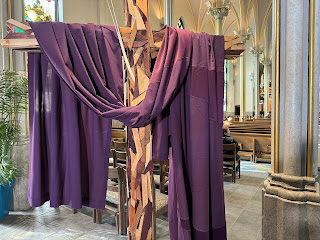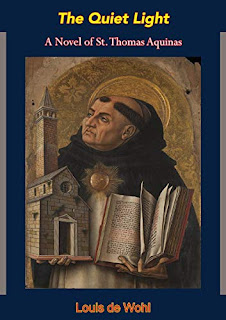What a scene today’s Gospel suggests! Jesus could well be a modern political candidate (or perhaps a delegate at the Synod of Bishops) being pestered by the media, each group – Pharisees, Sadducees, scholars of the Law – posing some complex question, clearly trying to trap Jesus in his answer!
Like the earlier questions, this was intended to be tricky – tricky because the Law contains 613 commandments. Few, however, would have quarreled with Jesus’ answer, taken straight from the book of Deuteronomy, chapter 6. For centuries, both before Jesus’ time and since, devout Jews have recited those words daily. The lawyer had only asked for one commandment – the greatest one – but Jesus also offered him another – also a familiar one, from the book of Leviticus.
Nor was this some isolated injunction. Today’s 1st reading – from Exodus – illustrates just how demanding the Old Testament is in regard to how to treat one’s neighbor – especially the poor, the weak, the vulnerable. Hence, the Jewish law’s emphasis on just treatment of foreigners and immigrants. Of course, prejudice against foreigners is nothing new, nor was it confined to ancient Israel. The Old Testament repeatedly reminded the people that they too had once been foreigners and were descended from immigrants – as is true of all of us here today.
So, Jesus’ statement that the commandment to love one’s neighbor is like the commandment to love God was not some novelty. It is deeply rooted in the Jewish scriptures, which suggest that, when one wrongs one’s neighbor, one also offends God, in which case God’s wrath will make itself felt!
The two commandments are connected, Jesus tells the lawyer. Jesus is here setting out the essential basis for moral living – not something added on to the rest of one’s life, but its essential component. Obviously, the Bible does not offer quick and easy answers to each and every ethical question that may arise. But what it does do is to describe a relationship between God and us and also among us on which we are challenged to build our individual and collective moral lives.
In Matthew’s account, which we have just heard, there is no follow-up question, asking exactly who counts as my neighbor. Presumably, people took for granted the traditional understanding of neighbor as a fellow-member of one’s family, one’s clan, one’s tribe, one’s community, a fellow citizen of our society, someone I am supposed to feel connected to.
We can, of course, expand the circle (as Exodus did) to include foreigners and immigrants. Indeed, we can keep expanding the circle wider and wider to include ever more people. That’s what happens In Luke’s telling of this story, when the lawyer – wanting, we are told, to justify himself – follows up by asking, who is my neighbor? We are all familiar with Jesus’ answer there – the parable of the Good Samaritan – which certainly suggests a significant expansion in the notion of who my neighbor is.
Still, in the world we actually live in, we naturally, inevitably, and rightly think first and foremost of those we have more concrete connections with as our neighbors. That makes sense. We do have special obligations toward certain people – parents to their children, children to their parents, relatives to other relatives, workers to coworkers, vendors to customers, political leaders to the citizens they represent and are supposed to serve, and citizens to the society that keeps us safe and enables us to flourish. Sometimes, however, as we have sadly seen over and over, people may react to real or imagined threats to themselves and their near neighbors in irrational ways which further erode the connections that create and sustain communities.
Of course, it will always be the case that we naturally and inevitably think of as our neighbors, first and foremost, those we have more concrete connections with. We all start with ourselves and gradually (and with some effort) learn to build bridges outward, starting with family, then moving on to others we share space with or have some common interest with, gradually growing to include all our fellow citizens and, hopefully, even beyond. That is why the commandment says to love your neighbor as yourself. Obviously, we have to start somewhere, and that somewhere starts with ourselves.
But a fulfilling human life expands beyond oneself to include others – and more and more others. Historically, that has been our experiences as a national community, gradually expanding the circle of who counts as citizens entitled to full participation in the life of our community and whom we are supposed to care about.
Something similar was the experience of Servant of God Isaac Hecker, the founder of the Paulist Fathers, who started out focused on evangelizing his fellow Americans, primarily people like himself, and gradually grew into a more universal sense of his mission.
The good – but challenging – news that is the Gospel of Jesus keeps expanding the circle even farther.
Homily for the 30th Sunday in Ordinary Time, Saint Paul the Apostle Church, NY, October 29, 2023.
Photo: The five Lancet Windows over the main entrance of Saint Paul the Apostle Church above the Crucifixion mural by artist William Laurel Harris.





